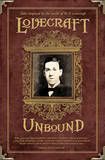Lovecraft Unbound / Edited by Ellen Datlow
 Dark Horse Comics / October 2009
Dark Horse Comics / October 2009
Reviewed by: Blu Gilliand
Let me go ahead and get this out of the way: I’m no fan of H.P. Lovecraft. There. I said it. And while I know this will have many of you grabbing your pitchforks, lighting your torches and heading south to find my house, please understand – I’ve tried. Many, many times. Every few years I’ll take my paperback collection of Lovecraft stories off the shelf and dive in, thinking that this time, with a more seasoned eye and broadened tastes since the last time I tried — this time it will happen. This time I’ll “get it.”
But I don’t. I just don’t. I can’t make it past the (for me) impenetrable prose to get to the meat and heart of what so many others love.
But that’s okay, because I think my inability to “get” Lovecraft makes me the perfect person to review Ellen Datlow’s new anthology Lovecraft Unbound. This may be my ticket in. Because what Datlow wanted out of her contributors was not for them to do their best Lovecraft imitation – instead, she sought stories that were expressions of the authors’ love for Lovecraft. She wanted them to take the things that spoke to them in his writing and express them in their own style.
Many of them succeeded in doing just that. And in doing so, they have opened the door for me to, after all these years, finally understand what all the fuss is about.
Take “The Crevasse” by Dale Bailey and Nathan Ballingrud, for example. In it, a member of an arctic expedition explores a mysterious crack in the ice, populated with strange carvings and the leathery rustlings of unseen creatures. It’s tense and atmospheric, keeping the monster in the shadows so that our imaginations can run wild with it.
Or Brian Evenson’s “The Din of Celestial Birds,” in which a man loses four months of his life when he stumbles across a mysterious stone hovel in the mountains. He goes in to inspect a strange, empty cage he spies inside, and comes out a man changed in ways he doesn’t understand until it’s far too late.
Or “In the Black Mill” by Michael Chabon, in which an archaeologist comes to a small town to conduct some fieldwork, only to get sucked into a mystery involving the dig site, a mill that routinely maims its workers, and a strange, homebrewed beer.
What these stories, and others in the collection, have in common is the idea that we are blind to the true nature of the world around us, and that there are things going on behind the thin veil of reality that would drive us mad in a single glance. This is, I understand, one of the main themes of Lovecraft’s work. And while I may not have gotten the message from Howard Phillip himself, it’s come through loud and terrifyingly clear in Datlow’s anthology. So thanks to Datlow and all the able contributors for opening this reviewer’s eyes to the attraction of Lovecraft, and to the notion that the universe is a vast and mysterious place, where things slither and glide in the dark, just waiting for me to look their way.
Purchase Lovecraft Unbound, edited by Ellen Datlow.



